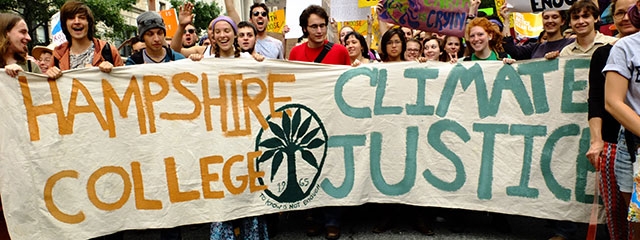In the series “Student Voices,” current students write about the reasons they chose Hampshire and how our educational model works from their perspective.
Back in middle school I met with the principal about getting rid of our lunchroom’s Styrofoam trays. I remember it being one of my most important times in seventh grade.
I arranged a meeting with her secretary, wore my best-looking business attire, and came prepared with a speech about how horrible Styrofoam is for the environment: it could take up to a million years for every piece of the material to biodegrade, it’s made out of oil, and it’s one of the main causes of ocean pollution.
She smiled at me across her large maple meeting table and told me how well prepared I was and how I should join the school’s eco club when I got to high school.
That was that.
Colleges that care about sustainability
But here I am now at Hampshire College, a place that encompasses what it means to be sustainable, as seen in our active student body. New Leaf, a student group that is being started up again this fall, was responsible for banning the sale of plastic water bottles on campus two years ago. (Good luck trying to buy one of those around here. Instead, we have bottle-filling stations all around campus!) They also had a Light Bulb Brigade Initiative, replacing old light bulbs with mercury-free LED bulbs. There was even a course here one spring called Reinventing the Toilet, all about creating a more sustainable toilet that doesn’t waste gallons of water each flush.
While changes such as these are definitely an important step in being sustainable, I believe the true beauty of Hampshire’s environmental care is the drive and action from the community to create systemic, global change.
In 2011, thanks to a new investing policy adopted at Hampshire, we were the first school to move our endowment away from funding fossil fuels.
Since my first semester here, I’ve been an active member of Hampshire Climate Justice, a group that fosters active organizing to mitigate the climate crisis we are now pitted against. Our focus is on how climate change is a social injustice issue, an unjust reality that affects communities who have done the least to cause the problem. There cannot be a livable climate without justice and there cannot be justice without a livable climate. Together, we have been to numerous actions around the northeast, committed civil disobedience, educated students, took more than 80 students to the People’s Climate March, and worked in solidarity with local groups, now focusing on opposition against the proposed Kinder-Morgan pipeline.
There’s an extremely supportive community here that builds activists and thinkers who are ready to empower one another and work to fight the greatest issue of our time. Hampshire students recognize that there’s more to college than just studies, that “to know is not enough,” and how we must be active global citizens. That’s my favorite part about this community. Everywhere I seem to look there are students mobilizing around important issues, whether it be unionizing workers, climate justice, stopping mass incarceration, maintaining the Hampshire woods, or making compost more accessible. “Sustainability” is a relative term, and Hampshire seems to embody all aspects of it.







Hampshire’s best demonstration of how to model proper sustainability would be to find a way to sustain itself to the point where annual TRB for a student would cost no more than one half the likely entry level first year salary a graduate is likely to earn.